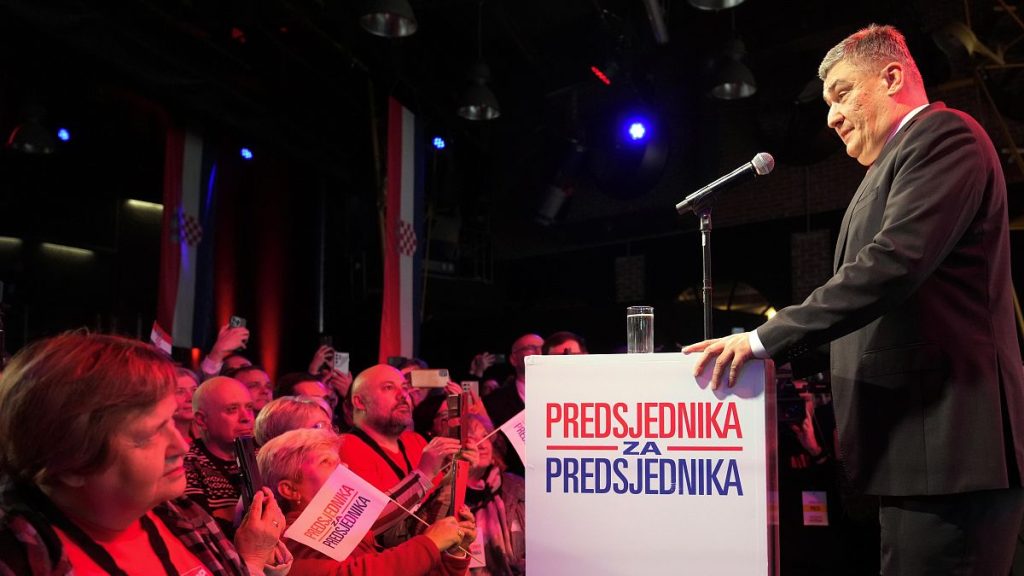Croatia’s Presidential Election Heads to Runoff: Milanović Leads but Falls Short of Outright Victory
Croatia’s presidential election, held on Sunday, resulted in a first-round victory for incumbent President Zoran Milanović, but his 49% vote share fell short of the required majority, necessitating a runoff election against the ruling party’s candidate, Dragan Primorac. Pre-election polls accurately predicted this outcome, forecasting that none of the eight contenders would secure over 50% of the vote. Milanović, known for his left-leaning political stance and outspoken criticism of Western military aid to Ukraine, acknowledged his first-round win but emphasized the need for continued effort in the upcoming runoff scheduled for January 12th. While expressing gratitude to his supporters, he cautioned against premature celebration, stressing the importance of remaining grounded and focused on the next stage of the election.
The political landscape in Croatia is marked by a stark contrast between Milanović and Prime Minister Andrej Plenković, whose conservative HDZ party backs Primorac. Plenković has framed the election as a choice between Croatia’s alignment with the West and a potential eastward shift under Milanović’s leadership. He has labeled Milanović as "pro-Russian" and a potential threat to Croatia’s international standing within the EU and NATO. This narrative underscores the broader geopolitical implications of the election, highlighting the tension between maintaining Western alliances and pursuing a more independent foreign policy. Milanović’s critics often compare his combative communication style to that of former US President Donald Trump. This comparison further emphasizes the polarized nature of Croatian politics and the potential for a disruptive presidency should Milanović secure a second term.
Milanović’s stance on the war in Ukraine has been a central theme of the election. He has consistently criticized NATO and EU support for Ukraine, advocating for Croatia to remain neutral in the conflict. Despite Croatia’s membership in both alliances, Milanović has argued against taking sides in global disputes. This position has drawn criticism from those who believe Croatia should actively support Ukraine against Russian aggression. His decision to block Croatian participation in a NATO-led training mission for Ukraine further exemplifies his non-interventionist approach. This stance has resonated with some voters who are wary of escalating international involvement but has also raised concerns about Croatia’s commitment to its alliances.
Primorac, Milanović’s main challenger, has positioned himself as a staunch supporter of Croatia’s Western alignment. He has emphasized the importance of maintaining strong ties with the EU and NATO, contrasting his views with Milanović’s perceived eastward leanings. However, Primorac’s campaign has been overshadowed by a high-profile corruption scandal involving Croatia’s health minister. This case, which resulted in the minister’s arrest, became a focal point of pre-election debates and potentially hindered Primorac’s efforts to portray himself as a unifying figure. Despite advocating for unity and emphasizing Croatia’s global positioning, Primorac’s campaign has struggled to gain traction against the backdrop of the corruption scandal.
Beyond the two frontrunners, Marija Selak Raspudić, a conservative independent candidate, emerged as a distant third in pre-election polls. Her campaign focused on domestic issues such as economic challenges faced by ordinary citizens, corruption, and demographic decline. While unlikely to win the presidency, Selak Raspudić’s focus on these concerns highlights the importance of bread-and-butter issues in Croatian politics. The presidential election is Croatia’s third vote this year, following parliamentary and European Parliament elections, indicating a period of significant political activity and engagement. These repeated elections provide insights into the evolving political landscape and the key issues shaping public discourse.
The upcoming runoff election will be crucial in determining Croatia’s political direction for the next five years. The stark contrast between Milanović and Primorac presents voters with a clear choice between two distinct visions for the country’s future. Milanović’s potential re-election could lead to a more independent foreign policy stance, potentially straining Croatia’s relationships with its Western allies. Conversely, a Primorac victory would likely reaffirm Croatia’s commitment to the EU and NATO, emphasizing closer cooperation with Western partners. The outcome of the runoff will significantly impact Croatia’s domestic and foreign policy trajectory, making it a pivotal moment in the country’s political history. The election highlights the ongoing debate between maintaining established alliances and charting a more independent course in an increasingly complex global landscape.

